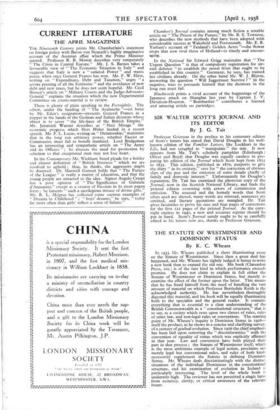THE STATUTE OF WESTMINSTER AND DOMINION STATUS By K. C.
Wheare
In 1933 Mr. Wheare published a short illuminating essay on the Statute of Westminster. Since then a great deal has happened, and Mr. Wheare has rightly judged it better to write a new book than to expand the old one. His book (Clarendon Press, los.) is of the rare kind in which performance exceeds promise. He does not claim to explain in full either the Statute of Westminster or Dominion Status, but merely to examine the effect of the former upon the latter. This means that he has freed himself from the need of handling the vast amount of material on which Professor Berriedale Keith is the acknowledged authority. He, has nevertheless thoroughly digested this material, and his book will be equally illuminating both to the specialist and the general reader. It contains everything that is essential to a clear understanding of the British Commonwealth as a " constitutional structure," that is to say, as a society which rests upon two classes of rules, rules of strict law, and non-legal rules or conventions. The starting point of Mr. Wheare's inquiry is Dominion Status in 1926— itself the product, as he shows in a concise and clarifying survey, of a century of gradual evolution. Since 1926 the chief emphasis has been laid upon removing the " disconformities " with the convention of equality of status which was explicitly affirmed in that year. Law and convention have both played their part in that process ; the Statute of Westminster itself, which is the most ambitious example of legal action, proclaims not merely legal but conventional rules, and rules of both kinds necessarily supplement the Statute in defining Dominion Status. Mr. Wheare deals discriminatingly with the distinct situations of the individual Dominions in the constitutional structure, and his examination of evolution in Ireland is particularly interesting. The level of the whole book is uniformly high. The reviewer has not perceived a single lapse from accuracy, clarity, or critical awareness of the relevant issues.














































 Previous page
Previous page